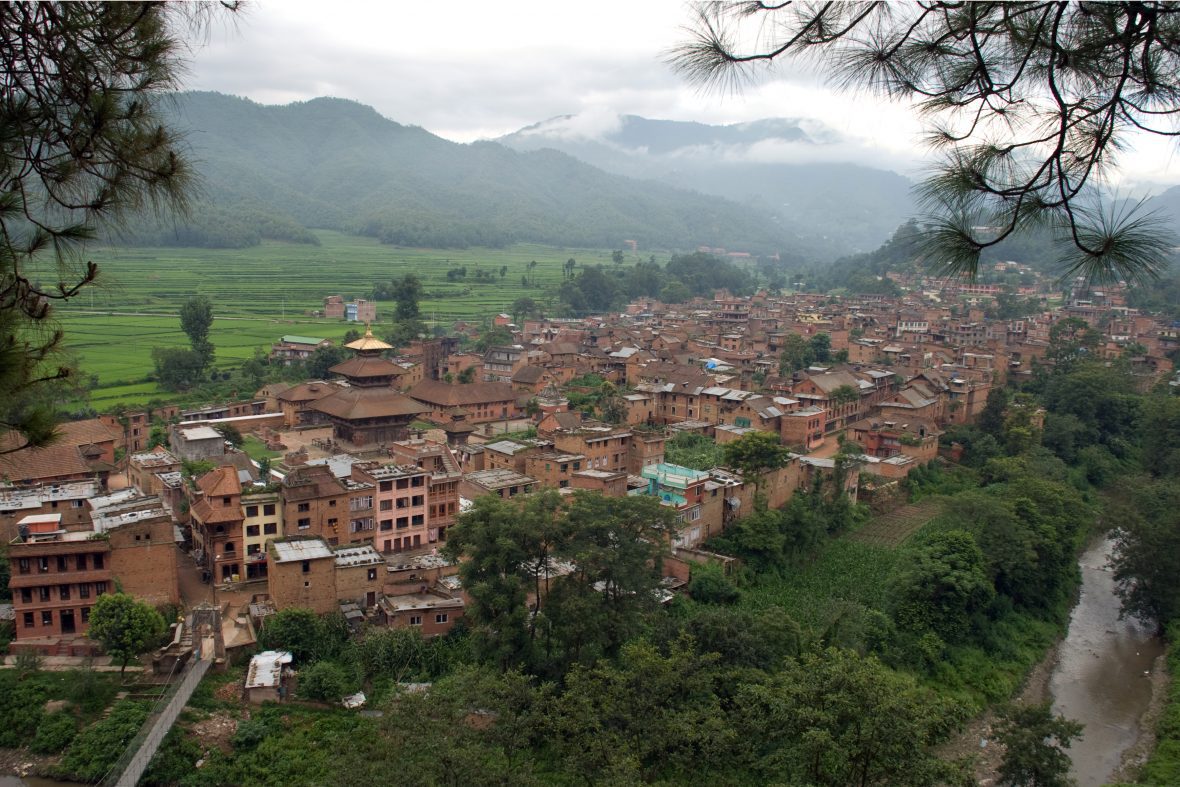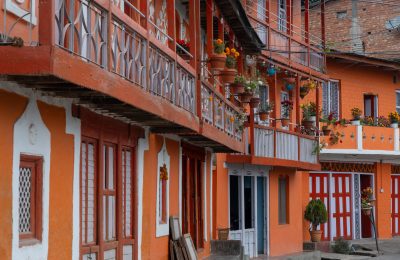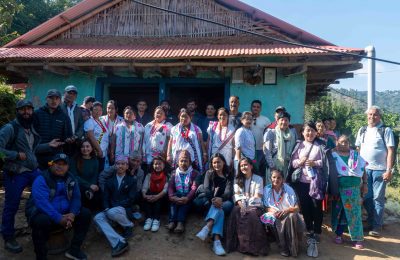Panauti is a beautiful town steeped in history and culture. Panauti is just a 1.5-hour drive (32 kilometers) southeast of Kathmandu, Nepal. Panauti is home to over 25,000 people and is full of beautiful temples, monuments, culture, and natural scenery. This historic town is located at the confluence of the Rosy and Punyamati Rivers. Local myth suggests that a third imaginary river, Lilawati, also converges with the two other rivers making Panauti a holy tri-junction.
The Lilawati River is said to be visible only to wise people with divine blessings. Panauti has a rich history of being a big producer of metal equipment and utensils in the early days of the Kathmandu Valley. Let us dive into the topic of Panauti tales exploring the history, culture, and many more.
Originally a Newari town, Panauti displays a harmony of multicultural influences, being home to Brahmin, Tamang, and Sanyasi populations. While tourism is emerging as a significant economic force, agriculture remains deeply ingrained in the daily lives of the locals.
Community-led tourism projects provide a unique opportunity for travelers to engage in authentic experiences, including farming activities, fostering a symbiotic relationship between visitors and the community that aids the community members, mostly women’s, economic and social development.
Panauti is also home to a diverse set of communities and cultures. The different lifestyles of different communities also make Panauti a living museum. Agricultural roots, culinary practices, social occasions, and deep faith in tradition create a very immersive atmosphere for the visitors to observe, understand, and have a better appreciation of this enchanting place.
Coincidentally, the people of Panauti came together in 2011 to establish the Panauti Museum which houses numerous fascinating artifacts, conserves them, and is also a major tourist attraction.
History of Panauti
Panauti is one of the oldest towns in Nepal, with a population of about 25,000 people. A golden scripture inside the Indreshwor Mahadev temple dated 1385 suggests that Panauti was founded by King Harisingh Dev. Some historians also credit King Ananda Malla as the founder of Panauti. The town was once a busy trading hub during the era of the kings and queens until the unification of Nepal.
Nepal as a country didn’t exist as a country until 1769 AD. Nepal was a collection of small states ruled by minor kings and princes until Prithi Narayan Shah of Gorkha, unified these small fragmented states into one big Nation in the 16th Century AD. Before that the Malla kings used to rule Kathmandu and Panauti is believed to be a dowry given by king Bhupatindra Malla to his sister on her wedding.
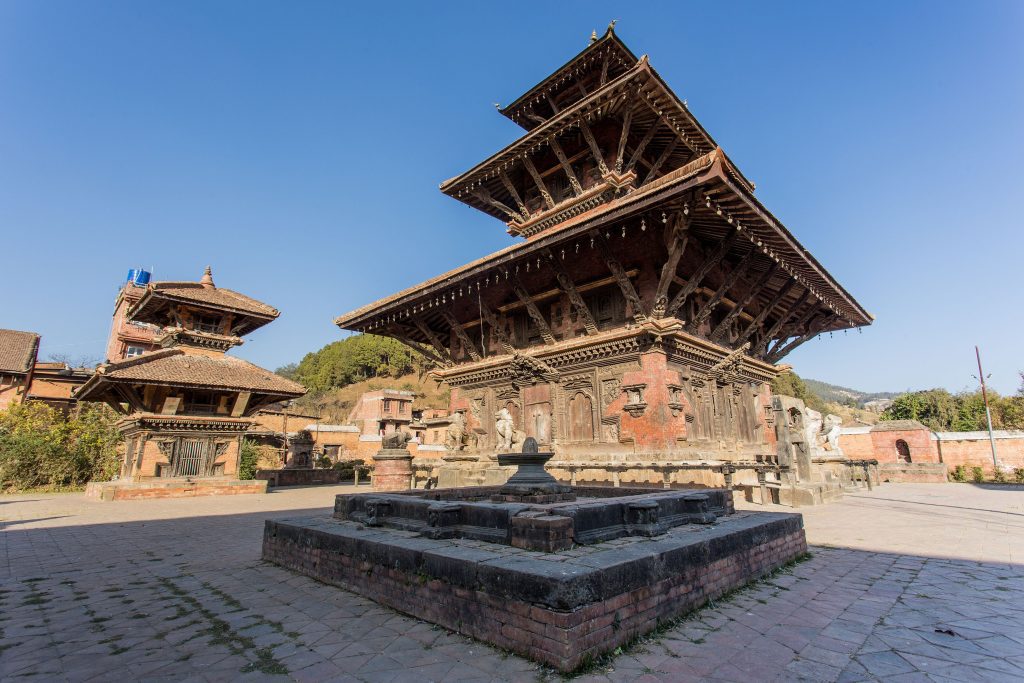
The artifacts of Banepa and Bhaktapur (Source – Community Homestay)
The earliest roots of Panauti stretch back to the 2nd and 8th centuries AD. Panauti was a thriving commercial hub that traded with Tibet in the North and various Nepali districts to the South and East. Domestically, Panauti also had good trade links with the neighboring districts of Banepa and Bhaktapur.
Panauti traded in metal utensils with nearby Lalitpur but also far away places like Dolakha to the East. Public resting places or sattals can be found scattered all around Panauti as a testament to its trading heritage as traders from far and wide would seek shelter during their travel.
The story about the location of Panauti also finds distinct mythological and geographical explanations. Mythology shows Panauti standing on the coiled body of the serpent King Basuki, assigned to protect the town from evil forces. Geography shows Panauti firmly lying on a single, giant rock making it able to withstand the forces of Nature. The rivers Rosy and Punyamati elevate the peaceful atmosphere of Panauti.
Cultural Significance: Panauti Tales
The centerpiece of Panauti, the Indreshwar Mahadev Temple, dating back to the 12th Century, is a splendid example of prime Newar architecture. Taking nine decades to complete, this temple dedicated to Lord Shiva mesmerizes visitors with intricate wood carvings and a pagoda-style structure, adding divinity to its surroundings.
The Indreshwar Mahadev Temple is a special site to behold in the living museum of Panauti which is also home to countless other monuments. This three-storied temple, displaying impressive work of traditional woodcarving, recites tales of gods and goddesses. The temple precinct is surrounded by several other smaller temples and installations that capture the imagination of the visitor and feed the soul with curiosity and amazement.
The legend behind the temple is also captivating. Indra, the king of the gods, is said to have attempted to intrigue the beautiful wife of Gautama Rishi, by taking his form when she was all alone. Gautama Rishi after finding out what Indra has done, cursed him to have a visible condition which was later reversed by Shiva.
Shiva is said to have appeared in Panauti as a lingam and the same lingam is believed to be the one inside the Indreshwar Temple. The site of these occurrences makes up the Sahsi Tirtha which holds great cultural and social importance.
The 16th-century temple of Unmatta Bhairav (a passionate manifestation of Lord Shiva) is a historic marvel that intrigues the senses. Three sages look down onto the visitors and pilgrims from the floor above. This setting is very rare among the temples of Nepal.
The Tula Narayan Temple and the Bamsha Gopala Temple are among other fascinating religious monuments in Panauti. It is quite rare for a town of just 118 square kilometers to have so many significant monuments.
Panauti isn’t merely a canvas of historical tales but also a culinary haven. Yomari, a popular Newari dish, finds its roots in Panauti, making it a destination for culinary exploration as well. Travelers can also find small eateries and family-owned food shops offering authentic Newari snacks and delights.
The town’s architectural beauty unfolds at Panauti Durbar Square, a UNESCO World Heritage Site. The square stands as a testament to the town’s glorious past, with the Panauti Museum preserving artifacts that transport visitors back in time when gods, kings, traders, and hermits walked the narrow brick-paved streets.
Festivals and Traditions of Panauti
The vibrant festivals of Panauti breathe life into every street, celebrated with deep faith and enthusiasm. With over twenty festivals observed annually, the Panauti Jatra, or Jya: Punhi in Newari, is celebrated as the main festival in Panauti.
This grand carnival, spanning three days, attracts locals and visitors alike. It is celebrated according to the Nepalese calendar but is usually observed between May – June.
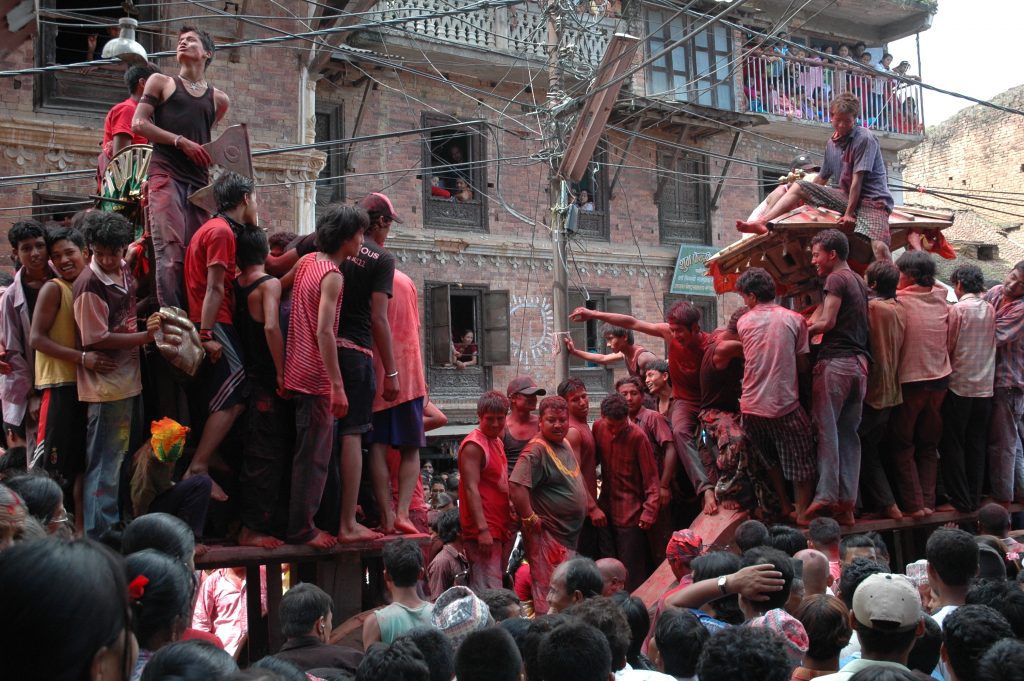
Banepa Jatra (Source – Community Homestay)
Chariots and processions fill the streets with colorful decorations, while traditional Newari music and dance echo across the stress and traditional courtyards. Beyond mere festivities, the Jatra serves as a social collective, which brings the different communities in and around Panauti together.
Another remarkable celebration is the Indra Jatra, usually celebrated in September and a homage-paying ceremony to Lord Indra, the god of rain. A massive wooden pole known as a “Yosin” is erected as a tribute to Indra. This practice shows the role of symbolism in Nepali worship. The farmers celebrate Indra Jatra more enthusiastically with the hopes of bountiful rain that will ensure a good harvest.
Things to Do and See in Panauti
Let us delve into some of the activities that can be done in Panauti.
1. Hike to Namo Buddha
Get out in the sunshine for a serene 3-4 hour hike to Namo Buddha, one of the most revered Buddhist pilgrimage sites located about 10 kilometers from Panauti. Namo buddha and its fascinating legend of a prince, a tigress, and her cubs, symbolize compassion.
A prince is said to have offered himself as a sacrifice for the cubs of a tigress who could no longer produce milk. This sacrifice is embodied in the peaceful and tranquil atmosphere of Namo buddha. The Thrangu Tashi Yangste monastery awaits, offering a peaceful sanctuary amidst calm forests and quaint villages.
2. Try Local Cuisine
The streets of Panauti are a culinary haven, inviting you to embark on a flavorful journey. Dive into local eateries and restaurants that showcase the rich gastronomic heritage of the Newari town. However, why stop at savoring? Participate in preparing authentic Nepali food with homely hosts in Panauti. Select ingredients from the market or harvest them from the farm, unveiling the secrets of Nepali cooking.
3. Panauti Museum
Delve into the past at the Panauti Museum, a treasure trove of artifacts, sculptures, ancient manuscripts, and intriguing objects. The museum offers a complete overview of Panauti’s evolution, providing insights into local customs, trades, and rituals that have shaped the town.
4. Homestay Experiences
Give yourself into the heart of Panauti by choosing a traditional homestay. This not only offers an understanding of Panauti as a destination but also provides an immersive experience of the Nepali way of life. Engage with locals, savor authentic Newari cuisine, and participate in daily life. Community Homestays also elevate the living standard of the locals and empower the women of the community. The Community Homestay program also allows the locals, especially women, to take an active part in their development.
5. Panauti on a Cycle
Go beyond the well-known landmarks, discovering hidden locations in the surrounding hills accessible by bike. Every turn brings something unique. The Panauti Bike Station, a local business, offers heritage routes passing iconic landmarks like Panauti Hydropower, a silk farm, and the picturesque town of Khopasi. Feel the wind on your face as you ride through winding woody slopes, making this bike tour an experience of a lifetime.
Getting There
Panauti’s proximity to Kathmandu makes it a convenient destination for day trips or extended stays. Located approximately 32 kilometers from Kathmandu, the town is easily accessible in less than an hour by private vehicle or an hour and a half by public bus.
Panauti lets travelers step back in time and embrace its immersive atmosphere. Its convenient location, cultural abundance, and vibrant atmosphere make it an ideal destination for those seeking a unique blend of history, adventure, and authenticity. As you listen with your heart, Panauti plays a melody that resonates on a much higher level making you feel one with yourself and at peace with the rest of the world.


